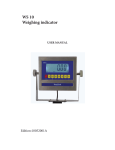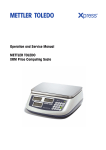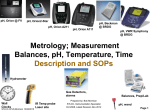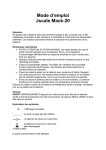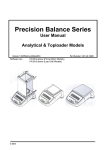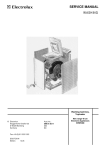Download WBT User Manual.indd
Transcript
WeighSouth WBT Toploader Balance Part List Balance .....................................................................................1 pc. Weighing Pan .........................................................................1 pc. Draft Shield (Model WBT-100 only) ................................1 pc. Calibration Weight .................................. WBT-100, WBT-602 AC Adapter..............................................................................1 pc. Instruction Manual...............................................................1 pc. Unpacking Carefully unpack the balance and remove it from its styrofoam supports. You may want to keep the original box and packing materials for storing the balance when not in use. If the balance is damaged contact the supplier immediately. Keep all packing materials as they were when you received them. Setting up the Balance Place the balance on a level surface, free of vibration. In order to keep you balance functioning at its best we suggest thay you do the following: • • • • • • • • • Avoid Extremes of temperature. Do not place in direct sunlight or near air conditioning vents. Make sure the balance is located on a strong table and free from vibration. Avoid unstable power sources. Do not use near large users of electricity such as welding equipment or large motors. Keep free from vibration. Do not place near heavy or vibrating machinery. Avoid high humidity that might cause condensation Keep away from direct contact with water. Do not spray or immerse the balance in water. Do not place near open windows, air-conditioning vents or fans that may cause a draft and unstable readings. Technical Specifications Model WBT-100 WBT-602 WBT-5001 Capacity (g) 100 g 600 g 5000 g Readability (g) 0.001 0.01 0.1 Weighing units g, kg, oz, ct, lb, t, ozt, dwt, GN Zero range To capacity by subtraction Stabilization time 3.5 seconds 2.5 seconds Optimum operating temp. 64°-77°F / 18°-25°C Power requirements 8-AA alkaline batteries (included) or AC adapter (included) Calibration User calibration from keypad Display (in/mm) LCD (0.75”) Pan size L x W (in/cm) 3” dia Dimensions H x W x L 9.5” (H) x 7.5” (in/cm) (W) x 10.5” (L) 5” dia 7” x 6” 3” (H) x 7.5” (W) x 10.5” (L) Draft Shield 6.5” x 6.5” x 6” Optional NA Net Weight (lb/kg) 9 lb 6 lb 5.06 lb Model Gram (g) Kilogram (kg) Decimal Ounce (oz) Carat (ct) Decimal Pound (lb) Troy Ounce (ozt) Pennyweight (dwt) Grain Unit (GN) WBT-602 600 x 0.01 0.6 x 0.00001 21.2 x 0.0001 3000 x 0.05 1.3 x 0.00001 19.3 x 0.0001 385.8 x 0.01 9259.4 x 0.1 WBT-5001 5000 x 0.1 5 x 0.0001 176 x 0.001 25000 x 0.5 11 x 0.0001 160 x 0.001 3215 x 0.1 77161.7 x 1 WBT-100 100 x 0.001 0.1 x 0.000001 3.52 x 0.00002 500 x 0.005 0.22 x 0.00001 3.2 x 0.00002 64.3 x 0.001 1543.2 x 0.01 Turning on the Balance and Self-testing 1. Connect the AC adapter to an available wall socket and plug the other end of the cable into the balance. 2. Press the ON / OFF key to turn the scale on. A display test will be performed (5 seconds). 3. Once the display shows “0.0g” the balance is ready to use. 4. To turn the scale off, press the ON / OFF key Sample Weighing 1. Press TARE / ZERO to make the balance return to zero. 2. Load the sample onto the scale pan. 3. The weight is stable when g (depending on which weighing unit is active) appears on the display. Weighing with Container Sometimes it is necessary to weigh an object (such as a liquid) using a container. To display just the weight of the contents (net weight) and not the whole combined weight (gross weight), the TARE button is used. 1. Place an empty container on the weighing pan. 2. Once the weight stabilizes, press the TARE / ZERO key briefly. The display will return to zero. 3. Add the sample to the container. 4. The weight is stable when “o” appears in the top right corner of the display. Unit Switching This balance has 10 possible weighing units. They are gram (g), carat (ct), pound (lb), ounce (oz), troy ounce (oz), grain (GN), pennyweight (dwt), Newton (N), Tola (T), and T/A/R. Follow these instructions to change the weighing unit: 1. Press the UNIT button. 2. The weighing unit will cycle between the different weighing units with each press of the button. Parts Counting With items of uniform weight (ie. all the pieces are of equal weight value) it is possible to use this scales parts counting feature to quickly and accurately obtain a piece count. To use the parts counting feature, follow these instructions: 1. Press the MODE key until the display shows “pcs” to indicate parts counting mode. 2. The display will show “10 pcs” to indicate that you should place a sample quantity of 10 pieces onto the platform. You may change the sample size by pressing the “CAL” button. Possible sample sizes are 10, 20, 50, 100, 150, 200, 250, and 500. 3. Press MODE again once you have selected the sample quantity placed on the platform. 4. You can now add any number of pieces to the platform (or container) and the display will show a count. 5. To exit counting mode press the MODE key. Notes: The larger the sample size used, the more accurate the count will be. Tare can be used in this mode. Calibrating the Balance The balance may need to be calibrated in certain situations such as: Before weighing for the first time After the balance has not been used for some time If the balance location has changed If ambient temperatures have changed greatly 1. Clear the weighing pan and press TARE to re-zero the balance. 2. When the balance is stabilized press and hold the CAL button for 5 seconds. 3. The display will show “-CAL-” then the required weight will flash on the display. 4. Place the calibration weight onto the center of the platform and wait for the display to stop flashing. 5. You may now remove the weight. The scale will return to normal weighing mode Linear Calibration Linear calibration adjusts the balance at two or more points, rather than just one. To enter linear calibration, follow these steps: 1. Clean the weighing pan and press TARE to re-zero the balance. 2. When the balance is stabilized, press and hold the CAL button for 5 seconds. 3. The display will show “-CAL-”, then the standard calibration weight will flash on the display. 4. At this point, press and hold the MODE button for 5 seconds. 5. The display will flash the first required calibration weight for linear calibration. Place the required weight onto the center of the platform. 6. Once the weight is accepted, the display will flash the next required calibration weight. Place the required weight onto the center of the platform. The weights value will be displayed when it is accepted. Care & Maintenance Please read all operating instructions carefully before use. Scales are precision instruments and should always be handled with proper care. To ensure years of reliable service, keep these simple tips in mind: • • • • • • • • • Do not exceed the scales maximum capacity. Overloading your scale can permanently damage it! Avoid exposure to extreme heat or cold. Scales perform best at normal room temperature. If temperatures have changed dramatically, recalibration may be necessary. Allow your scale to warm up for three hours before performing initial calibration. Store your scale in a clean, dry location. Dust, dirt, and moisture can accumulate on the weighing sensors and electronics causing inaccuracy or malfunction. Avoid static electricity sources, as they can have an adverse effect on the weighing sensors. Always weigh on a flat and level surface, free from vibrations and drafts. The corner of a room is usually the most stable. Gently apply all items to be weighed. Do not drop items onto the weighing platform. Avoid dropping your scale. The warranty does not cover damage due to rough treatment or overload. Keep the weighing pan clean using a soft cloth. Do not use harsh chemicals. The Manufacturer warrants each product to be free from defects in materials and workmanship, and to conform to its published product specific cautions under normal use and service for the period of one year commencing from the date of purchase. The foregoing warranty is extended only to the first purchaser and applies only to product failures due to defective materials and/or workmanship. Without limiting the generality of the foregoing, the foregoing warranty will not apply if, upon inspection, it is found that the product was: misused or abused; used for a purpose for which it was not designed; mishandled; placed in an improper environment; repaired by unauthorized personnel; or improperly installed or adjusted. The sole and exclusive remedy in the event of any breach of the foregoing warranty shall be for the original purchaser to return the product to The Manufacturer, freight and insurance prepaid, for repair, replacement or credit, at The Manufacturer option. Any product repaired or replaced under the foregoing warranty shall be shipped back to customer freight and insurance prepaid. The sole and exclusive remedy in the event of any breach of the foregoing warranty shall be for the original purchaser to return the product to The Manufacturer, freight and insurance prepaid, for repair, replacement or credit, at The Manufacturer option. Any product repaired or replaced under the foregoing warranty shall be shipped back to customer freight and insurance prepaid. IN NO EVENT SHALL THE MANUFACTURER BE LIABLE FOR ANY LOSS, INCONVENIENCE, OR DAMAGE, INCLUDING WITHOUT LIMITATION DIRECT, OR INDIRECT, SPECIAL, INCIDENTAL OR CONSEQUENTIAL DAMAGES, RESULTING FROM OR RELATED TO THE USE OR INABILITY TO USE A PRODUCT, WHETHER RESULTING FROM BREACH OF WARRANTY OR ANY OTHER LEGAL THEORY, EVEN IF THE MANUFACTURER HAS BEEN ADVISED OF THE POSSIBILITY OF SUCH INCONVENIENCE, DAMAGE OR LOSS.








